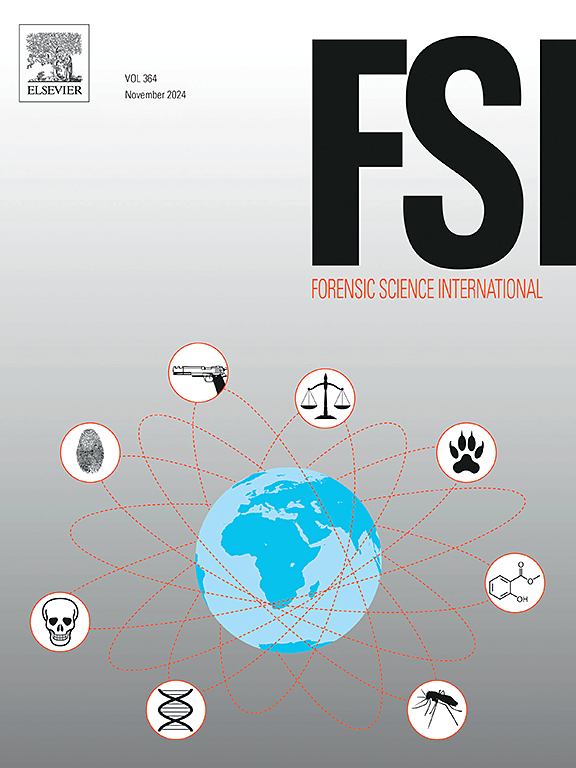STR标记在复杂亲属调查中的有效性
IF 2.5
3区 医学
Q1 MEDICINE, LEGAL
引用次数: 0
摘要
在这个案例报告中,我们提出了一个复杂的亲属关系调查的结果,涉及六个人,他们的生物样本是在很长一段时间内提交的,指示不明确和不断变化。最初,其目标似乎是重建家庭关系,但其潜在动机尚不清楚。随着基因分析的进展,新的个体被添加进来,焦点逐渐转向隐藏的父权问题。为了阐明受测个体之间的家族联系,我们结合了常染色体、X染色体和y染色体短串联重复序列(STR)标记,并结合了稳健的统计方法。从各种个人物品中提取DNA,并使用经过验证的法医套件和软件生成STR档案。最初的常染色体STR分析主要揭示了三名女性和一名男性个体的家族关系。随后纳入的另外两个个体不仅支持了最初的发现,而且揭示了两个受试者之间先前隐藏的父子关系。使用X和Y-STR标记进一步分析验证了常染色体STR分析结果,从而支持先前建立的家族关系。尽管存在某些样本的DNA质量较差和提供的背景数据不足等问题,但遗传数据允许对多重亲属关系进行高可信度的解决,包括确认全兄弟姐妹和半兄弟姐妹关系,母亲联系和父亲关系。这个案例强调了分子遗传学工具在揭示隐藏的家庭结构和解决复杂法医背景下有争议的亲子关系方面的功效。本文章由计算机程序翻译,如有差异,请以英文原文为准。
Efficiency of STR markers in complex kinship investigations
In this case report, we present the results of a complex kinship investigation involving six individuals, whose biological samples were submitted over an extended period with unclear and shifting instructions. Initially, the goal appeared to be a general reconstruction of familial relationships, yet the underlying motive remained unclear. As the genetic analyses progressed, new individuals were added, and the focus gradually shifted toward a concealed paternity issue. To clarify the familial connections among the tested individuals, we applied a combination of autosomal, X and Y-chromosomal Short Tandem Repeat (STR) markers, coupled with robust statistical methods. DNA was extracted from various personal items, and STR profiles were generated using validated forensic kits and software. Initial autosomal STR analysis primarily revealed familial relationships among three female and one male individual. The subsequent inclusion of two additional individuals not only supported the initial findings but also revealed a previously concealed paternity relationship between two of the subjects. Further analysis using X and Y-STR markers verified the autosomal STR analysis results, thereby supporting the previously established familial relationships. Despite issues like poor DNA quality in certain samples and insufficient contextual data provided, the genetic data allowed for high-confidence resolution of multiple kinship ties, including the confirmation of full- and half-sibling relationships, maternal links, and paternity. This case underscores the efficacy of molecular-genetic tools in revealing concealed familial structures and resolving disputed paternity within complex forensic contexts.
求助全文
通过发布文献求助,成功后即可免费获取论文全文。
去求助
来源期刊

Forensic science international
医学-医学:法
CiteScore
5.00
自引率
9.10%
发文量
285
审稿时长
49 days
期刊介绍:
Forensic Science International is the flagship journal in the prestigious Forensic Science International family, publishing the most innovative, cutting-edge, and influential contributions across the forensic sciences. Fields include: forensic pathology and histochemistry, chemistry, biochemistry and toxicology, biology, serology, odontology, psychiatry, anthropology, digital forensics, the physical sciences, firearms, and document examination, as well as investigations of value to public health in its broadest sense, and the important marginal area where science and medicine interact with the law.
The journal publishes:
Case Reports
Commentaries
Letters to the Editor
Original Research Papers (Regular Papers)
Rapid Communications
Review Articles
Technical Notes.
 求助内容:
求助内容: 应助结果提醒方式:
应助结果提醒方式:


